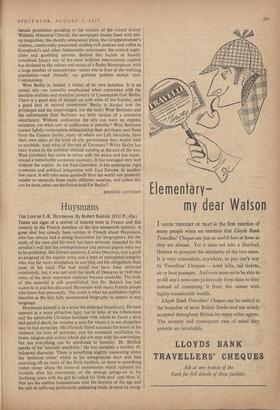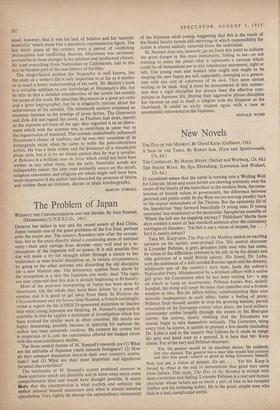Huysmans
THE LIFE OF J.-K. HUYSMANS. By Robert Baldick. (O.U.P., 42s.) THERE are signs of a revival of interest both in France and this country in the French novelists of the late nineteenth century. A great deal has already been written in French about Huysmans, who has always had a strong fascination for biographers, but the study of the man and his work has been seriously impeded by the novelist's will that his correspondence and private papers were not to be published. His literary executor, Lucien Descaves, was a gruff ex-sergeant of the regular army and a man of undoubted integrity who was far more scrupulous in carrying out his obligations than most of his kind. The ban could not have been enforced indefinitely, but it was not until the death of Descaves in 1949 that some of the most important material became available. The bulk of this material is still unpublished, but Dr. Baldick has had access to it and has discussed Huysmans with many French people who knew him personally. The result is what his publishers rightly describe as the first fully docUmented biography to appear in any language.
Huysmans himself is in a sense the principal beneficiary. He now appears in a more attractive light, but in spite of his tribulations and the admirable Christian .fortitude with which he faced a slow and painful death, he remains a man for whom it is not altogether easy to feel sympathy. His Flemish blood accounts for much of his violence, his love of extremes, and his continual oscillation be- tween religion and ordure which did not stop with his conversion; but not everything can be attributed to heredity. Dr. Baldick speaks of his 'neurotic sensibility.' He was certainly a morbid, ill- balanced character. There is something slightly nauseating about the 'petticoat crises' which in his unregenerate days sent him scurrying off on tours of the Paris brothels, as there is something rather messy about the tours'of monasteries which replaced the brothels after his conversion, or the strange goings-on in his declining years with the girl he called his 'little bird' and Mme X. Nor are his endless lamentations over the horrors of the age and his cult of suffering particularly endearing traits. It must be recog-
nised, however, that it was his lack of balance and his 'neurotic sensibility' which made him a peculiarly representative figure. The last thirty years of the century were a period of conflicting philosophies and conflicting theories. Huysmans was extremely susceptible to these changes in the spiritual and intellectual climate. He tried everything from Naturalism to Catholicism, and in this way he became part of the case-history of his time.
The Anglo-Saxon passion for biography is well known, but the study of a writer's life is only important in so far as it enables us to reach a better understanding of his work. Dr. Baldick's book is a valuable addition to our knowledge of Huysmans's life, but he tells us that a detailed consideration of the novels lies outside the scope of his work. He describes Huysmans as a great art critic and a great hagiographer, but he is singularly reticent about the achievement of the novelist. The nineteenth century witnessed an immense increase in the prestige of prose fiction. The Goncourts and Zola did not regard the novel, as Flaubert had done, merely as the supreme art-form of the age; they regarded it as an instru- ment which with the sciences was to contribute in some way to the regeneration of mankind. This attitude undoubtedly influenced Huysmans's choice of medium, and he was very conscious of its propaganda value when he came to write the post-conversion novels. He was a horn writer and the possessor of a remarkable prose style, but it is by no means certain that he was a novelist. A Rebours is a brilliant tour de force which could not have been written in any other form; but the early Naturalist novels are indisputably minor; the later ones primarily essays on the occult, religious conversion and religious art which might well have been more impressive if the author had discarded the pretence of fiction and written them as criticism, diaries or plain autobiography.
MARTIN TURNELL



































 Previous page
Previous page